Critic of Liberal Democracy
It has been more than a hundred years since the German legal scholar Carl Schmitt (1888-1985) began publishing his legal and political studies. Unlike the fate of many of his contemporaries, Schmitt’s thought is not forgotten. In fact, it receives steady attention from young scholars, who find in his work much that is valuable.
Schmitt was an advocate of relentless realism at a time of deep social and ideological division. This divisiveness is a key characteristic of both Weimar Germany and 21st-century America. Quite daringly, Schmitt questioned the worship of an elusive pluralism to which many Americans remain captive. He unequivocally endorsed cultural and moral unity as the precondition for any workable form of self-government. It is not diversity but homogeneity, Schmitt contended, that allowed such a regime to operate.
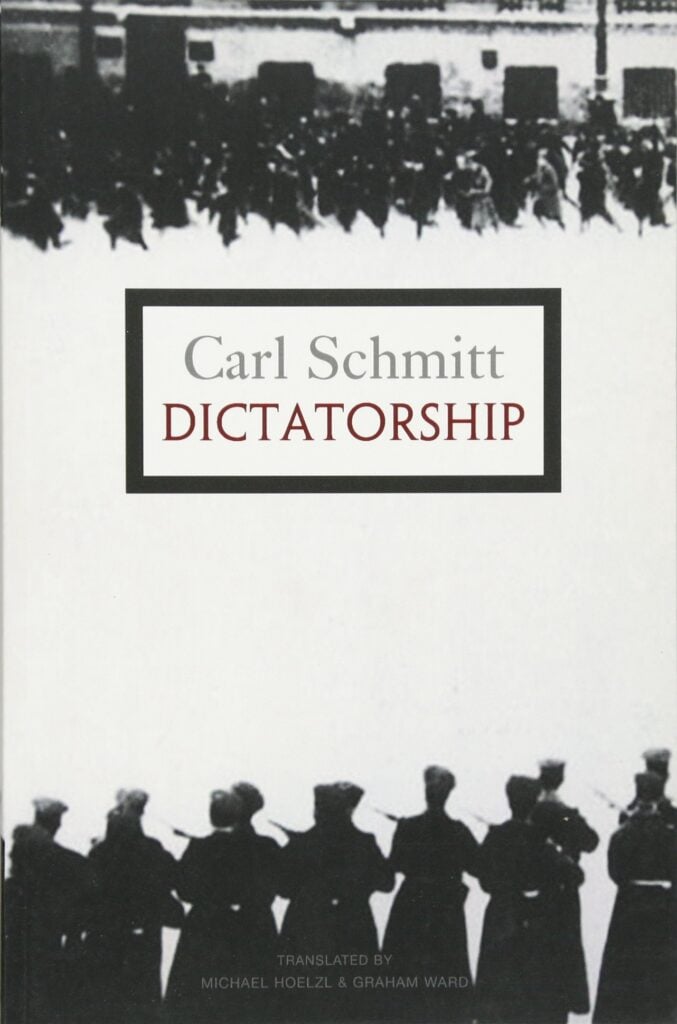
2013)
This versatile scholar wrote on many subjects over his lifetime of 97 years, but three of his major themes are particularly well-known even in translation. The first is his exploration of the inherent conflicts among such systems of rule as parliamentary liberalism, democracy, and authoritarianism. This is the leitmotif of three of his books: Political Romanticism, Dictatorship, and The Crisis of Parliamentary Democracy. The second theme is his analysis of sovereignty, which is the core topic of his book Political Theology. The third theme is his consideration of how irresolvable political conflicts can be addressed while limiting existential enmity and avoiding total war. This last overarching theme shapes Schmitt’s most famous work, The Concept of the Political, which exists in multiple translations and was first published in 1932.
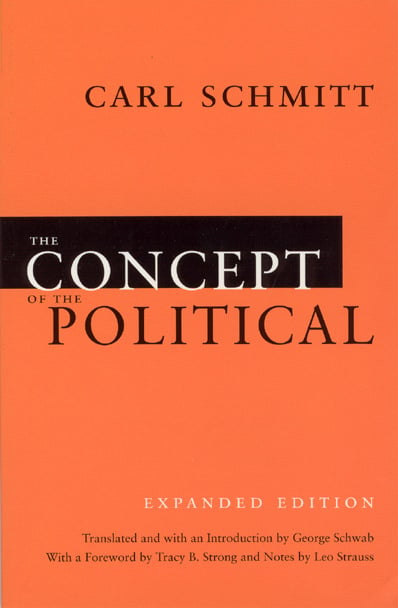
(University of Chicago Press,
2007)
In the early 1900s Schmitt studied jurisprudence in Strasbourg, Munich, and Berlin; at that time the theory of positivism dominated German legal thinking. Schmitt’s early writings expressed some doubt about this approach to legal and political theory. They questioned whether real nations could operate within legal systems that had been constructed by “experts” on the basis of their own conceptual guidelines, a position that in the German-speaking world was identified with the Austrian-Jewish jurist Hans Kelsen. The emotional and physical upheaval of World War I and his own rootedness in a Rhineland Catholic culture set Schmitt on a very different path, which was opposition to artificial legal systems that had no roots in a particular people and culture.
After the German loss in World War I and postwar revolutionary disturbances, Germany’s left-center parties produced the Weimar Constitution, which was promulgated in 1919. This document furnished Germany’s governing framework until 1933, and it offered the occasion for the articulation of some of Schmitt’s critical reflections on constitutional government. Schmitt saw the Weimar system as inadequate to the political challenges besetting his ideologically divided country, and so he attempted, as he explained, to “shift away from tactical and technical questions to intellectual principles and a starting point that does not lead to a dead end.”
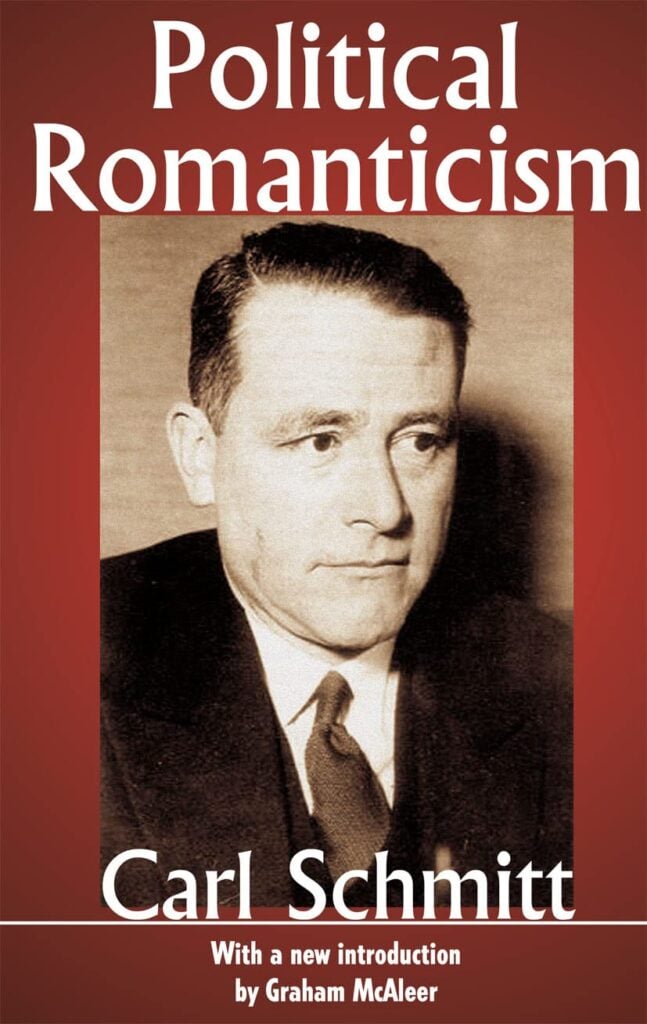
(Routledge, 2010)
Curiously, Schmitt’s first postwar study, Political Romanticism, which appeared in 1919, starts off as an aesthetic study before moving on to political questions. In this work, Schmitt took to task those who treated critical events through which they were living in an escapist fashion. These “romantics” manipulated words to create emotional effect while standing back from the real engagements of their time. Such self-absorbed fantasists could not look reality in the face. Instead, they indulged in “endless conversation,” which never led to purposive action.
Demanding something more than conversation does not, however, indicate what that added requirement should be. Schmitt’s works in the interwar period supplied this alternative in the form of “decisionism.” This designated what Schmitt considered the proper exercise of power in a critical situation. According to Schmitt, because no system can contain within itself all the preconditions for successful governance, ultimately one supra-legal authority must decide questions that are not covered by existing law. “The decisionist enacts the proper law in a correctly recognized political situation by means of his personal decision,” Schmitt wrote. Schmitt proposed decisionism as superior to the “endless conversation” which he found in Weimar-style parliamentarianism. This party system, argued Schmitt, had become an “empty apparatus” in the face of the political division that was convulsing Germany.
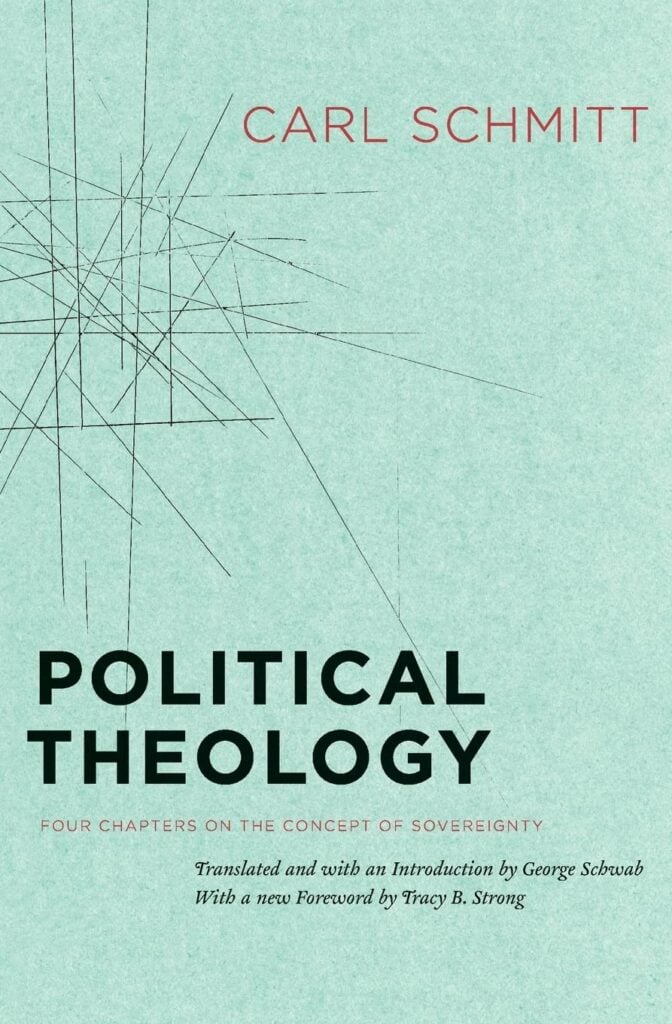
Chapters on the Concept of
Sovereignty (University of
Chicago Press, 2006)
For Schmitt, all nations required someone who could make critical decisions when a political emergency, or what he called an “exception,” arose. Such decisions and the decision-maker did not surge forth from a preexisting body of laws. Exceptions arose even where there is a legal government, but one that cannot meet an unexpected contingency. A gap therefore has occurred in the law and must be filled; and this task is inherently political. Someone must address the concrete situation that the law does not deal with in order to restore order. Thus, the opening line of Schmitt’s Political Theology contains this memorable aphorism: “Sovereign is he who decides on the exception.”
Schmitt rejects the definition of the State propounded by his teacher, renowned social theorist Max Weber. Weber famously defined the state as an entity that enjoys a monopoly of force. Rather, what defines sovereignty, and therefore ultimately the state, according to Schmitt, is the sole right to issue decisions that are not based on existing law. This is not an extra-legal arrangement. The sovereign issuing the decision is making law in an emergency situation and will necessarily reestablish an order as a set of norms, at some future point. Schmitt describes the irregular situation in this manner:
The exception is more interesting than the rule. The rule proves nothing; the exception proves everything: It confirms not only the rule but also its existence, which derives from the exception.
(Note that presenting Schmitt’s thought in the wooden translation above may be tantamount to sacrilege, seeing that he is among the most graceful stylists ever to write in German.)
In defining sovereignty, Schmitt also introduced the concept of “the Political” as a separate “endeavor of human thought and action” that requires drawing critical distinctions. “The specific political distinction to which political actions and motives can be reduced is that between friend and enemy,” he wrote. The enemy “is, in an intense way, existentially different and alien.” Therefore,
in the extreme case conflicts with him are possible. These can neither be decided by a previously determined general norm nor by the judgment of a disinterested and therefore neutral third party.
The antagonism that defines the Political is “the extreme case,” and the participants enter a life-and-death conflict based on whether “the adversary intends to negate his opponent’s way of life.” The reasons for arriving at this decision may vary, but an unbridgeable line of division separates the two self-identified groups that are drawn into strife.
Schmitt’s notion of the Political is still controversial and is most definitely not the friendly face of the caring-sharing welfare state. On the contrary, Schmitt wrote that “the Political is the most intense and extreme antagonism.” In Schmitt’s view, every concrete antagonism becomes an expression of the Political, and any antithesis that forces groups into the positions of friend and enemy fits the definition of the Political. The ultimate form of the Political understood as antagonism is combat, which may lead to the killing of other men. An underlying threat of violent conflict lay at the heart of every political disagreement. Schmitt wrote:
War follows from enmity. War is the existential negation of the enemy. It is the most extreme consequence of enmity. It does not have to be common, normal, something ideal, or desirable. But it must nevertheless remain a real possibility for as long as the concept of the enemy endures.
Schmitt did not maintain that war is in itself desirable, and he praised the nation-state that developed in early modern Europe for restricting violence by setting up international rules for warfare. But Schmitt thought such strife would inevitably occur, no matter what the efforts to limit it. “War is neither the aim nor the purpose nor even the very content of politics,” he wrote. “But it is an ever-present possibility which determines in a characteristic way human action and thinking and thereby creates a specifically political behavior.”
According to Schmitt, the modern liberal state, which asserts the primacy of the individual and is focused on economic prosperity, may have trouble dealing with the reality of war. A state may justify killing to deal with “an existential threat to one’s own way of life,” but certainly not to achieve a higher gross domestic product. Schmitt wrote:
To demand seriously of human beings that they kill others and be prepared to die themselves so that trade and industry may flourish for the survivors or that the purchasing power of grandchildren may grow is sinister and crazy.
Failure to understand the Political may even have the effect of ideologizing and totalizing war. Schmitt criticized the tendency in modern warfare to deny entirely the humanity of one’s enemies. He maintained that such an attitude renders hostilities even more bitter.
Such a war is necessarily unusually intense and inhuman because, by transcending the limits of the political framework, it simultaneously degrades the enemy into moral and other categories and is forced to make of him a monster that must not only be defeated but also utterly destroyed. In other words, he is an enemy who no longer must be compelled to retreat into his borders only.
Moreover, Schmitt viewed this demonization of one’s foe as characteristic of liberal societies, which dwell on their moral superiority. Looking at America since the presidency of Woodrow Wilson, Schmitt might have found a confirmation for this intuition.

(Duke University Press,
2004)
His study Legality and Legitimacy (1932) may be the most relevant for grasping our own political and cultural situation. In this work, published just before the Nazi seizure of power, Schmitt asks whether a legislative state, one that is based on legislative supremacy, should determine the core norms of a constitution. By “norms,” Schmitt meant expressions of the substantive values of a people, which preexist its constitution. For Schmitt, constitutions that are not merely expendable procedural guidelines should arise from the will of a people and their sovereign. They should not be the creations of imaginative intellectuals. “Norms are intended to be just and are the highest, decisive expression of the community will,” he wrote. All else is subordinated to “this law of laws.”
If such norms do exist, this implies that any law promulgated by a parliament which contradicts them should be invalid. This assumption would furthermore suggest that a legislature’s power can be easily challenged if a crisis of authority results. Legislative state regimes are fragile especially when they are constructed on the basis of procedural guidelines without reference to the will and traditions of a particular nation.
In the face of the challenge represented by the Nazi and Communist Parties in Germany, both of which swelled in membership in the wake of the Great Depression, Schmitt believed Germany’s legislative state had shown itself to be inadequate. As an alternative he defended the act by which the aged German president, General Paul von Hindenburg, assumed emergency presidential powers to deal with the crisis at hand. Fortunately, the Weimar Constitution allowed for this assumption of presidential emergency power, and for Schmitt such a bold step seemed necessary for a legislative order that had become predictably impotent when challenged by internal breakdown.
Legality and Legitimacy also presents Schmitt’s thoughts on “equal chance.” Beyond ensuring that legislative acts are legal, what makes a legislative state legitimate must be its power to suspend the right of resistance. Although political movements in a parliamentary system should have the opportunity to win power, this should not include those who would actively deny an equal chance for their opposition. This meant in Schmitt’s case the Communists and National Socialists, but we might extend his exceptions to Western political parties that weaponize administrative power against their designated enemies. This, too, has become a means of denying others the right to compete for power.
In Schmitt’s analysis of equal chance, he also contends that majority rule, whether direct or indirect, can only work “when an essential similarity among the entire people can be assumed.” In that case elections become not acts that suppress political minorities, but an affirmation of consensus by a self-conscious people.
Such a consensus most definitely did not obtain in Weimar, and it cannot be found in the United States today. Schmitt saw a fatal problem with a regime that empowers its sworn enemy, and he reminded his readers that self-government is not a suicide pact. A subversive majority may try to suppress any effective opposition because it is not “bipartisanship” but the quest for total power that drives its actions. This is a repudiation of the rule that Schmitt said allows a legislative system to function, which is that an “equal chance of achieving a majority really remains open.”
A willful majority may choose to eliminate its opposition by pointing to an “emergency,” Schmitt wrote. He saw this trick as likely to set off a reaction:
Every critical moment endangers the principle of the equal chance because it reveals the inevitable opposition between the legal possession of power and the availability of an equal chance for the other side that also seeks to exercise political power.
It is therefore understandable that every call for “public security and order” by those at the helm of state will cause the other side to fear marginalization. It will then attack the majority party for denying it an equal chance. “The result is a condition without legality or a constitution,” Schmitt concluded.
Much of this analysis would seem to apply to today’s America, as we watch the administrative state and the majority party go after its battered opposition on charges of planning an insurrection. This action, it may be argued, is not taking place because of a recently invented legislative state of the kind that Schmitt critically examined in 1932. But it does bear out Schmitt’s distinction between legality and legitimacy. Governments that do not rest on the will of an identifiable people and that lack a source of sovereignty (and one would be delusional to attribute this quality to Joseph Biden) are headed for disaster.
All that may save them in the end is someone assuming power who can grapple with the Schmittian “challenge of the exception.” Like Germany in 1932, we are witnessing internal breakdown, and no appeal to the “constitution” (which is an expression of Schmitt’s concept of legality) will save us in the absence of a regime that rests on a cohesive citizenry that recognizes its rulers and fellow citizens as legitimate.
On a personal level, more than anything else, Schmitt wanted to be recognized for his undeniable talents. He wanted great men to seek his counsel, and this led him to join the Nazi Party in May 1933. For a while, Schmitt maintained the pretense of being a Nazi true believer, but by 1936 his enemies pointed out his deviationist thinking and previous anti-Nazi statements. Schmitt showed other biographical oddities unbefitting an authentic Nazi. He boasted of his Latin Catholic roots, was married to a Serb (rather than a Nordic spouse), and had attracted as a teacher many Jewish students and admirers, including Leo Strauss. After the war, he was barred from teaching because of his associations with the Third Reich, which had been mostly a troubled one. Schmitt spent his last 40 years living in relative obscurity, while continuing to publish brilliant legal and political works.


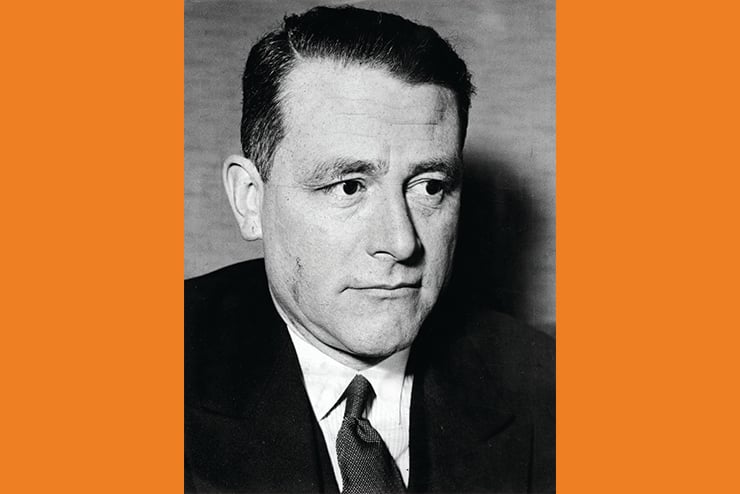
Leave a Reply